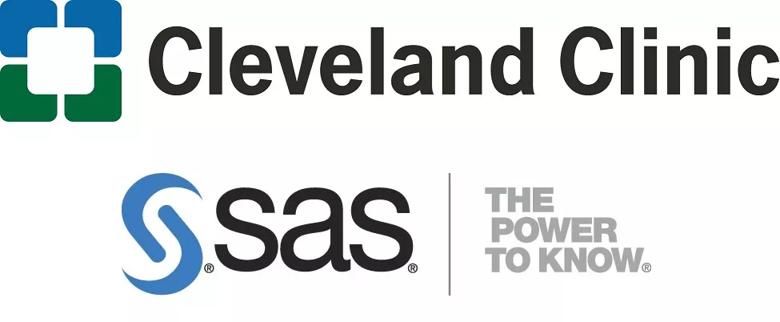Models help forecast bed and ventilator needs and predict impacts on critical supply chains, finance and staffing to optimize hospital preparedness before, during and after regional peaks

CARY, NC, and CLEVELAND, OHIO –To fight the novel coronavirus pandemic, Cleveland Clinic and SAS have created innovative models that help hospitals forecast patient volume, bed capacity, ventilator availability and more. The models, which are freely available via GitHub, provide timely, reliable information for hospitals and health departments to optimize health care delivery for COVID-19 and other patients and to predict impacts on supply chain, finance and other critical areas.

Image content: This image is available to view online.
View image online (https://assets.clevelandclinic.org/transform/c746f51e-a891-4ffc-8c74-6d87f9d58f63/cc-sas_jpg)
Unlike some forecasts that focus on a projection based on a single set of assumptions, these analytic models were used to create worst-case, best-case and most-likely scenarios, and can adjust in real time as the situation and data change. For example, the models can factor in social distancing’s dampening effect on disease spread.
Cleveland Clinic is using the models to support its decision making. With this information, Cleveland Clinic can predict and plan for future demands on the health system, such as ICU beds, personal protective equipment and ventilators. After reviewing possible COVID-19 surge scenarios generated by the models, Cleveland Clinic elected to activate a plan that prepared it for the worst-case scenario and has built a 1,000-bed surge hospital on its education campus for COVID-19 patients who don’t need ICU care. The hospital system also used the models to inform decisions about organizing and activating new labor pools.
“These predictive models were developed jointly by two organizations that understand patient populations, data and modeling,” said Chris Donovan, executive director of Enterprise Information Management & Analytics at Cleveland Clinic. “We are sharing the models publicly so health systems and government agencies globally can use them in their own communities. Our hope is that others contribute their ideas and improvements to the models as well.”
The GitHub link where the models are available has been visited more than 1,700 times in the past two weeks, resulting in more than 50 downloads.
At the heart of the work is an epidemiological SEIR model in which people move through the stages of Susceptible, Exposed, Infected and Recovered over time. The SEIR model developed by SAS and Cleveland Clinic is based on a University of Pennsylvania open source model that has been recoded and expanded on the SAS® analytics platform and continuously improved with real-time feedback from Cleveland Clinic epidemiologists and data scientists. The resulting models include flexible control of model parameters and different model approaches that consider regional health and demographic variations and state-level assumptions.
“These models can help hospitals, health care facilities, state departments of health and government agencies forecast the impact of COVID-19 and prepare for the future,” said Steve Bennett, Ph.D., Director of SAS’ Global Government Practice. “The models can also assist more vulnerable, less developed health systems in the fight against COVID-19.”
Dr. Bennett is the former Director of the National Biosurveillance Integration Center at the US Department of Homeland Security, and one of many SAS experts working with customers like Cleveland Clinic on the current crisis.
SAS has a long history of working with health care and life sciences organizations and is active in the response to COVID-19 in these industries and others. The models developed with Cleveland Clinic apply advanced analytics to data in order to help hospitals optimize the use of medical resources like ventilators and hospital beds. SAS is also focused on the use of analytics to improve situational awareness, ensure demand-planning stability, develop vaccines, and enhance contact traceability.
For more on how SAS is helping counter the pandemic, visit the SAS COVID-19 Resource Hub.
About Cleveland Clinic
Cleveland Clinic is a nonprofit multispecialty academic medical center that integrates clinical and hospital care with research and education. Located in Cleveland, Ohio, it was founded in 1921 by four renowned physicians with a vision of providing outstanding patient care based upon the principles of cooperation, compassion and innovation. Cleveland Clinic has pioneered many medical breakthroughs, including coronary artery bypass surgery and the first face transplant in the United States. U.S. News & World Report consistently names Cleveland Clinic as one of the nation’s best hospitals in its annual “America’s Best Hospitals” survey. Among Cleveland Clinic’s 67,554 employees worldwide are more than 4,520 salaried physicians and researchers, and 17,000 registered nurses and advanced practice providers, representing 140 medical specialties and subspecialties. Cleveland Clinic is a 6,026-bed health system that includes a 165-acre main campus near downtown Cleveland, 18 hospitals, more than 220 outpatient facilities, and locations in southeast Florida; Las Vegas, Nevada; Toronto, Canada; Abu Dhabi, UAE; and London, England. In 2019, there were 9.8 million total outpatient visits, 309,000 hospital admissions and observations, and 255,000 surgical cases throughout Cleveland Clinic’s health system. Patients came for treatment from every state and 185 countries. Visit us at clevelandclinic.org.
SAS is the leader in analytics. Through innovative software and services, SAS empowers and inspires customers around the world to transform data into intelligence. SAS gives you THE POWER TO KNOW®.
SAS and all other SAS Institute Inc. product or service names are registered trademarks or trademarks of SAS Institute Inc. in the USA and other countries. ® indicates USA registration. Other brand and product names are trademarks of their respective companies. Copyright © 2020 SAS Institute Inc. All rights reserved.